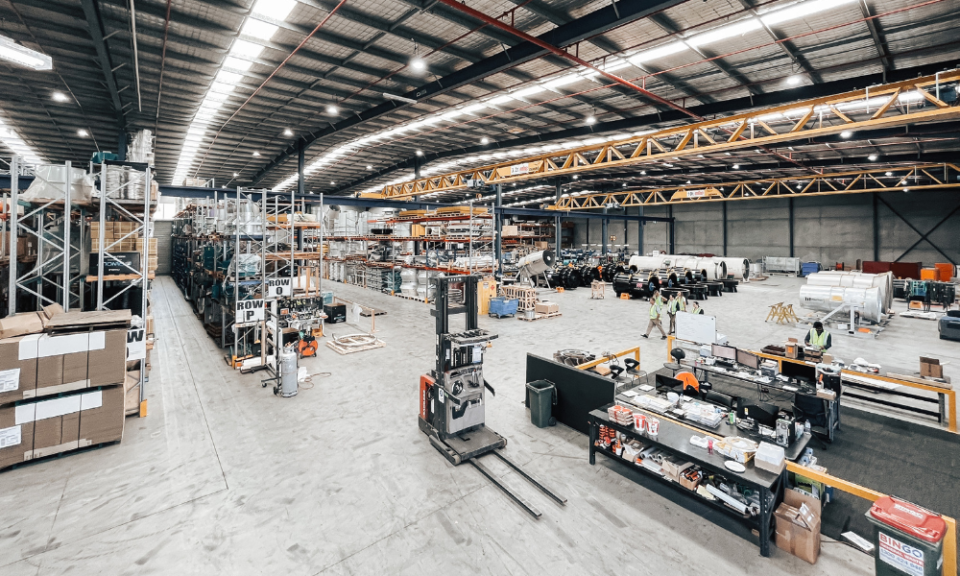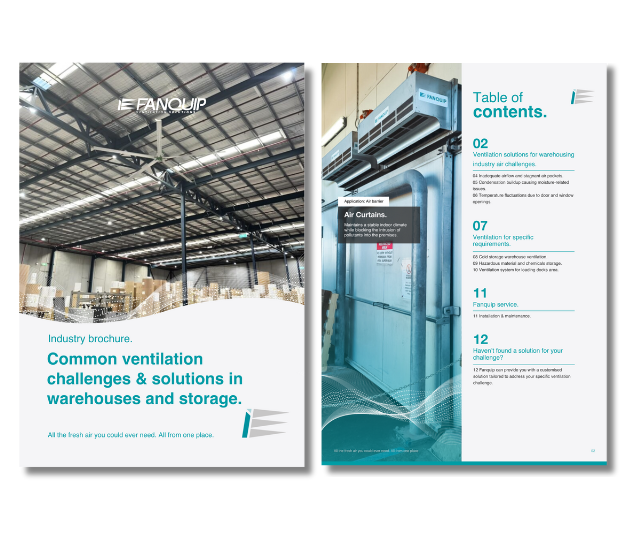Warehouses are crucial in the supply chain, ensuring efficient inventory management and logistics. Proper ventilation in these spaces is vital for maintaining product integrity and ensuring worker safety by eliminating hazardous fumes and chemicals. Based on customer feedback, we’ve identified common ventilation needs in warehouses.
Ventilation & Air Challenges In Food Processing.
Here, we present a range of industrial fans commonly used in warehouse settings to address these concerns.
Insufficient air circulation and stagnant air spots.
Stagnant air and inadequate airflow can degrade indoor air quality by accumulating dust, allergens, and pollutants, jeopardising employee health. It also leads to uneven temperature distribution, affecting the condition of stored items and creating uncomfortable hot or cold spots. Additionally, stagnant air allows odours to build up, making the workspace unpleasant. Consistent airflow prevents these issues by dispersing odours, maintaining product quality, and ensuring a safer, more comfortable environment for employees.
Fanquip recommends these fans:
- Air Circulators
- Giant Fans
- Axial Fan
Excess moisture from condensation causing damp-related issues.
When warm, moist air encounters cooler warehouse surfaces, it can lead to mould, rust, and spoilage of stored items. This often results from poor air circulation, temperature differences, and high humidity, causing moisture buildup. Such accumulation endangers product safety, warehouse integrity, and the overall storage environment.
Fanquip recommends these exhaust fans:
- Wall Exhaust Fan
- Roof Fan
- Heater Fan
Thermal imbalances from door and window openings.
Opened doors or windows in climate-controlled facilities let outside air with different temperatures and humidity disrupt the internal environment. This can cause rapid temperature shifts, affecting perishable goods, pharmaceuticals, and sensitive materials. To address this, warehouses use rapid door systems and air barriers to reduce air exchange, maintain stable conditions, ensure product quality, and improve energy efficiency.
Fanquip recommends these air control fans:
- Air Curtains
- Centrifugal Fans
- Air Circulators
- Heater Fans

Key Areas Requiring Ventilation Solutions.
Warehouse facilities often require tailored ventilation solutions to tackle unique challenges. Cold storage warehouses need precise control of temperature and airflow to prevent spoilage and protect stored items. Facilities that handle hazardous materials and chemicals require advanced ventilation with high-efficiency filters and chemical-resistant components to meet safety standards and regulatory requirements. Furthermore, loading dock areas demand ventilation systems that can manage high traffic and fluctuating conditions to ensure a safe and comfortable environment. Discover our range of fans designed to address these specific needs in warehouse settings.
Temperature-controlled storage ventilation.
Cold storage warehouses encounter key air-related issues including temperature stratification, moisture accumulation, and air infiltration, all of which can jeopardise perishable goods. Temperature stratification happens when warmer air rises and cooler air descends, causing uneven temperatures that may affect product quality. Moisture accumulation can lead to frost formation, potentially damaging both products and equipment. Furthermore, air infiltration through poorly sealed doors or inadequate insulation can disrupt the controlled environment, resulting in energy inefficiencies.
Recommended fans.
- Air Curtains
- Mancoolers
- Axial Fans
- Centrifugal Fans
- Exhaust Fans
- Giant Fans

Chemical storage facilities.
Chemical storage presents significant risks including toxic fumes, combustible vapours, and airborne hazards that can impact staff, infrastructure, and the environment. Even with proper management, hazardous fumes can cause health problems ranging from mild irritation to severe conditions, depending on the type of chemical and exposure duration. Symptoms like irritation of the nose, throat, and lungs can indicate more serious damage, with long-term exposure potentially leading to asthma, respiratory diseases, and cancer. Effective industrial fans and ventilation are essential for ensuring safety, compliance with Work Health Standards, and fire hazard prevention by mitigating dangerous vapour build-up that could trigger explosions.
Recommended fans:
- Purging fan.
- Wall exhaust fans.
- Roof fans.
- Axial fans.
Loading bay air management.
Loading dock areas can become stagnant, accumulating harmful pollutants such as vehicle emissions, dust, and airborne particles. These contaminants pose serious health risks to workers, potentially leading to respiratory issues. Poor air circulation can also cause temperature increases, creating an uncomfortable and hazardous environment that may result in heat-related health problems. Additionally, insufficient airflow can lead to unpleasant odours and moisture accumulation, which raises the risk of mould growth and corrosion of both stored items and the dock’s structure.
Recommended fans.
- Roof fans.
- Wall exhaust fans.
- Air curtains.
Fanquip Solutions For Warehouses and Storage.
Discover all our findings and recommendations for ventilation solutions in more detail by downloading the full version of the brochure here: Fanquip | Warehousing | Challenges & Solutions.

